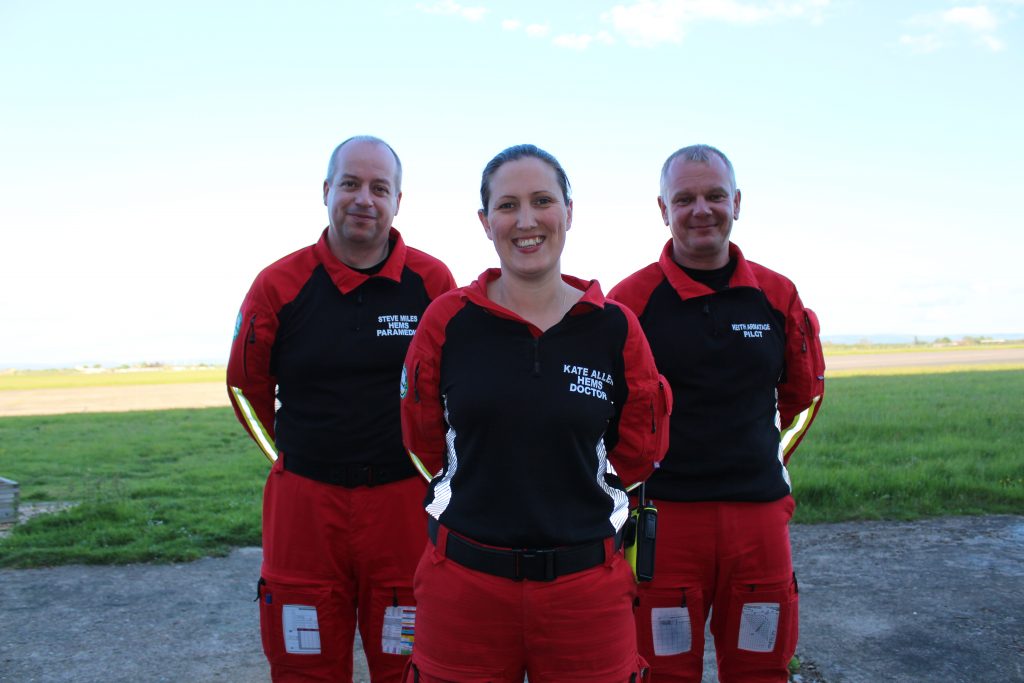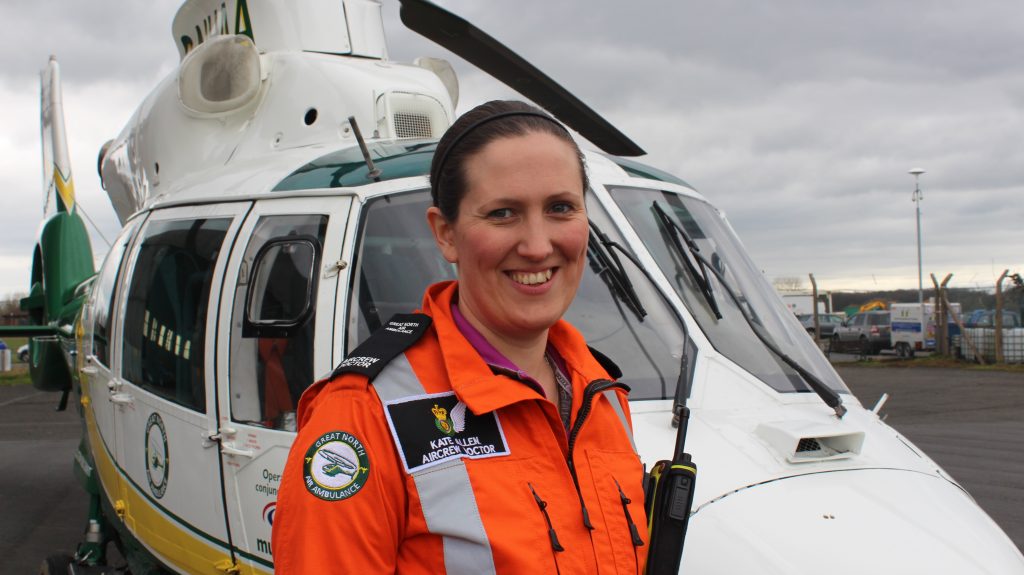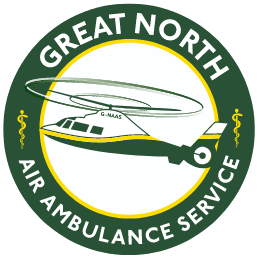“I have definitely met people throughout my career who don’t build others up, which is especially demoralising when it’s women who don’t champion other women and see others as a threat.”
After time spent as an emergency medicine doctor in some of the world’s worst conflict areas, Kate Allen joined the critical care team at GNAAS in 2018.
In this honest interview, Kate discusses her inspirational career, the difficulties she’s faced as a woman working in medicine, the people who inspire her, and that one piece of advice she would give her younger self.
Kate, what is your role at GNAAS and how long have you worked here?
I work at GNAAS as a critical care doctor.
I started working as a trainee at the charity about two and a half years ago in pre-hospital emergency medicine. The national training scheme I joined allows trainees in emergency medicine, intensive care medicine, and anaesthetics to sub-specialise in pre-hospital care.
I joined GNAAS in 2018.
What is your job outside of the charity?
I work as an emergency medicine doctor in the North East and I also work part-time for a humanitarian aid charity as a Disaster Assistance Response Team (DART) member.
What made you want to be a doctor?
I wanted a job that involved working with people – especially children.
I initially planned to become a paediatrician, specialising in paediatric oncology (cancer in children) but throughout medical school, I realised that I hated ward rounds, got bored really easily with set routines, and really enjoyed the acute/emergency part of medicine.
This eventually led me into switching to emergency medicine which means no clinics or ward rounds, and the job changes every few minutes!
Did you always know it was what you wanted to do?
No, initially I wanted to become a youth and children’s worker and considered leaving school after A-levels to work for a youth work charity. I was strongly encouraged to go to university though, so then I considered medicine or nursing for a good while and decided to chance applying for medicine to see if I would get in.
The rest is history!
Talk me through your career from the beginning until now?
I went to Newcastle University and studied medicine for two years. I then did two years as a foundation programme doctor (the baseline programme that all doctors leaving medical school in the UK do).
From there, I then spent a couple of years out of training, working in Australia and working as a teaching fellow. I also did a post-graduate diploma in medical education, learning how to teach medicine to others.
Following this I started my emergency medicine training. This took a couple of years longer than usual when I sub-specialised in pre-hospital medicine and I also worked abroad in disaster response.


Can we discuss your work in crisis areas and how you got into that?
I always knew I wanted to use my medical skills abroad as well as in the UK.
There are areas of the world that have such limited medical care and where people are really suffering, and I wanted to do something that left the world a little bit better.
I completed a post-graduate diploma in the medical care of catastrophes and conflict and I’d always been fascinated by medics that went out to earthquakes and hurricanes to provide relief but the thought of going to a war zone terrified me.
Over time though, I developed a real passion for refugee medicine and realised that to meet the needs of refugees, you must go to a few conflict zones. Following this course, I applied to a charity to work in disaster response.
What did you do while you were in the disaster zones?
So far, I’ve deployed six times to various disaster zones.
I’ve worked in a trauma hospital serving the civilians of the conflict in Mosul several times, in a surgical hospital serving the refugees fleeing from the genocide in Myanmar, in a refugee camp in Bangladesh and in the Bahamas working in a tent hospital after Hurricane Dorian.
I tend to deploy as an emergency medicine doctor, but you have to be fairly flexible with this kind of work. I’ve done intensive care medicine, paediatrics, and even some anaesthetics, plus lots of shovelling of dirt and restocking of the shelves.
Which role is the most rewarding?
All the roles have different rewards and challenges.
Overall, I think the disaster response work is the most rewarding as it’s got the most extremes, which make the rewards even richer. You might be in the direst of situations, looking after children suffering due to the war around them, but every life saved seems even more of a triumph when you consider you’re in a tent hospital, in a desolate place.
There are also a lot fewer doctors working out in these disaster zones so you know that if you weren’t there, there might not be anyone, which makes the work seem even more crucial.


What does an average day in the hospital look like?
There isn’t an average day in the emergency department – which is what I love about it!
Even if you have a plan for the day, it’ll go out the window at the first pre-alert call from the ambulance service. I love the variety though because in a single day you might see a child with tonsillitis, then someone with a heart attack, or a broken leg, plus any myriad of other things and It keeps you on your toes.
Do you have a stick-out job from any of your roles that’s always stayed with you?
In pre-hospital work, you’re very closely supervised until you’re competent enough to work without senior doctor supervision. This is called ‘sign off’.
One of my first jobs after ‘sign-off’ was a child who had been hit by a car and was in a bad way, but he made an excellent recovery. This was the first case I’d done, just me and a paramedic and without another doctor supervising me.
I know that the child would not have survived to hospital without the critical care elements that GNAAS can bring to the patient at the roadside. This is why GNAAS exists and I think of that case regularly – it’s why we do what we do.
How do you cope with the difficulties of the job?
I try to leave work at work.
I use the commute home to process the events of the day, think through the decisions made, consider if there’s anything I need to learn or reflect on and sometimes discuss it all with a trusted friend.
Then, when I pull up outside my house, I leave it outside.
It’s not always possible but that’s always my aim.


How do you juggle your work and home life?
I put personal commitments in the diary, and I guard those commitments as closely as I would a work shift. I used to cancel personal things for work all the time – cover shifts whenever needed and work late a lot, but the department will still keep ticking if I’m not there.
It’s so important to prioritise home life too.
What do you like to do in your free time?
Anything outdoors!
I love nothing better than being up a mountain with a couple of friends, cycling up the coast or camping for the weekend.
Who inspires you in your life?
My parents.
They are the most generous people I know. They have always had time for anyone who needs it, and they are always looking to see how they can meet people’s needs.
They model leaving this world in a better condition than they found it and they have supported my brother and I so much throughout our lives and are still our biggest cheerleaders.
What lessons have you learned along the way on your journey?
You can’t please everyone, and you’ll waste a lot of energy trying to.
Have you ever felt resistance or inequality in your line of work, away from GNAAS?
There will always be people who are negative and want to bring others down. It’s so important to recognise these people and not let their negativity affect you.
I have definitely met people throughout my career who don’t build others up, which is especially demoralising when it’s women who don’t champion other women and see others as a threat.
It’s a shame when you see women who have made it into a high professional position and who have to overcome a lot of adversity or inequality to do so, not clearing the way for others to do the same.
I don’t think you can change the behaviour of others, but you can change the future for others.
Piece of advice for your younger self or a young aspiring professional?
Don’t let other people tell you how your career has to go or that you have to do things a certain way to progress in your career.
I’ve taken time out of my medical training for multiple different things – all of which have made me a better doctor and have fulfilled my life more than the standard career path would have for me.
There have been a lot of people who have discouraged this and told me it would negatively impact my career and make people think less of me. I don’t think this has been the case but if I’d have listened, my life wouldn’t be better for it.



